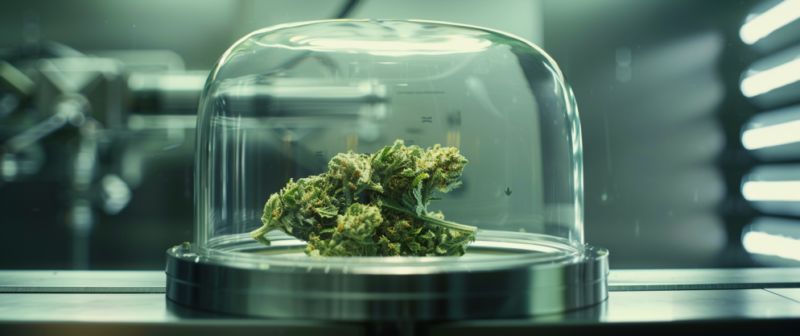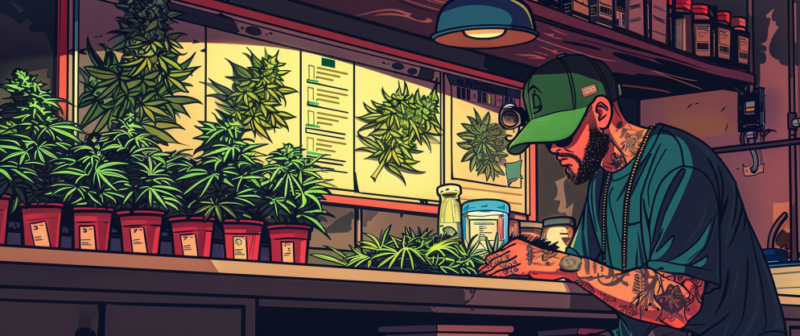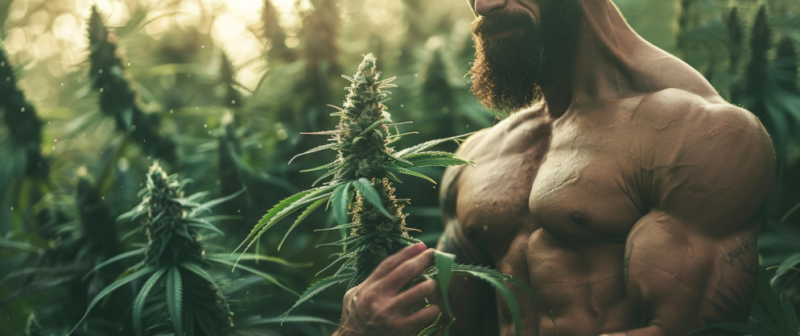What is full spectrum Delta 8
Have you heard of full-spectrum Delta 8 and wondered what sets it apart from other forms of Delta 8?
We will discuss what is full spectrum Delta 8 and how it differs from other cannabinoids like CBD and Delta 9. Before using it, we’ll also discuss how full-spectrum Delta 8 is made, its potential side effects, and important considerations.
Learn more about this intriguing cannabinoid and its uses.
What Is Delta 8?
Delta 8 is a naturally occurring cannabinoid found in the cannabis plant, known for its psychoactive properties and distinct chemical compound.
Its molecular structure is similar to Delta 9 THC, another well-known cannabinoid, but with a difference in the placement of a double bond. This structural variation gives Delta 8 its unique psychoactive effects, which are milder compared to Delta 9 THC, leading to a smoother high that many users find more manageable.
When consumed, Delta 8 binds to the body’s endocannabinoid receptors, primarily targeting the CB1 receptors in the central nervous system. This interaction has various effects, including euphoria, relaxation, and increased appetite.
Compared to Delta 9 THC, Delta 8 is often reported to deliver a less anxious experience, making it appealing to those who seek the benefits of cannabis without the overwhelming psychoactive effects.
What Is Full Spectrum Delta 8?
Full-Spectrum Delta 8 is a cannabinoid derived from the cannabis plant, offering a unique experience that sets it apart from other cannabis-derived substances.
Full-Spectrum Delta 8 refers to a type of cannabis extract that includes Delta 8 THC (tetrahydrocannabinol) along with a variety of other cannabinoids, terpenes, and compounds naturally found in the cannabis plant. Here are some key aspects:
- Delta 8 THC: Delta 8 THC is a cannabinoid similar to Delta 9 THC, the primary psychoactive compound in cannabis, but with slightly different effects. It is known for providing a milder, less anxious high compared to Delta 9 THC.
- Full-Spectrum: The term “full-spectrum” means that the extract contains a wide range of cannabinoids and terpenes from the cannabis plant, not just Delta 8 THC. This can include:
- CBD (Cannabidiol): Known for its non-psychoactive, therapeutic effects.
- CBG (Cannabigerol): Often referred to as the “mother of all cannabinoids,” it is non-psychoactive and has potential medicinal benefits.
- Terpenes: Aromatic compounds that contribute to the flavor, scent, and potential therapeutic effects of the cannabis product.
- Entourage Effect: The combination of Delta 8 THC with other cannabinoids and terpenes is believed to produce an “entourage effect,” where the various components work synergistically to enhance the product’s overall therapeutic effects.
What Is the Difference Between Full-Spectrum Delta 8 and Other Forms of Delta 8?
The primary difference between Full-Spectrum Delta 8 and other forms of Delta 8 lies in the chemical structure and the presence of different cannabinoids and terpenes, which create an entourage effect.
Full-Spectrum Delta 8 contains a wide array of cannabinoids, including THC, CBD, CBN, and CBG, and terpenes like myrcene, limonene, and pinene. These compounds interact synergistically with Delta 8, enhancing its effects and potential benefits on the body and mind.
This unique blend offers a more comprehensive therapeutic profile compared to isolated Delta 8 and provides a nuanced experience that many users find more enjoyable and effective.
How Is Full-Spectrum Delta 8 Made?
Full-Spectrum Delta 8 is made through a specialized extraction process from the cannabis plant, involving advanced chemistry techniques to isolate and concentrate the cannabinoid.
This extraction process typically begins with sourcing high-quality cannabis plants rich in Delta 8 THC. Once these plants are harvested, they undergo a series of steps to extract the desired cannabinoid. This can involve processes like CO2 extraction or ethanol extraction, which use solvents to separate the Delta 8 compound from the plant material.
The purity of the extracted Delta 8 is crucial in ensuring its effectiveness and safety for consumption. Advanced laboratory techniques such as chromatography are often used to purify the compound further, removing any impurities or unwanted substances from the final product.
Plus Delta 8, the cannabis plant contains a variety of other cannabinoids such as Delta 9 THC, CBD, and CBG. Each cannabinoid has unique extraction methods and properties, contributing to the entourage effect in full-spectrum products.
What Are the Things to Consider Before Using Full-Spectrum Delta 8?
Before using Full-Spectrum Delta 8, it’s essential to consider factors such as the appropriate dose, potency, and potential impacts on mental health and consult with a physician.
How Should Full-Spectrum Delta 8 Be Stored?
To maintain the quality of Full-Spectrum Delta 8, it should be stored in a cool, dark place away from heat and light to prevent contamination.
It is essential to store Full-Spectrum Delta 8 at temperatures below 70°F (21°C) to avoid degradation of its compounds. The ideal temperature range is between 60-65°F, ensuring the product retains its potency and efficacy. Sealing the packaging tightly after each use prevents air and moisture exposure, which can compromise the product’s integrity over time. Improper storage can lead to a loss of flavor, aroma, and overall effectiveness of Full-Spectrum Delta 8, affecting its therapeutic benefits.
What Are the Possible Interactions with Other Medications?
Full-Spectrum Delta 8 may interact with other medications, posing possible risks that should be discussed with a physician.
It’s crucial to be aware of potential drug interactions, as certain medications can either enhance or diminish the effects of Delta 8. For example, blood thinners like Warfarin may interact with Delta 8, leading to an increased risk of bleeding. Similarly, benzodiazepines such as Xanax can have intensified sedative effects when combined with Delta 8, potentially causing excessive drowsiness or respiratory sadness.
What Are the Potential Side Effects of Full-Spectrum Delta 8?
While Full-Spectrum Delta 8 offers various benefits, it also has potential side effects such as nausea, confusion, paranoia, and tiredness.
What Are the Risks of Using Full-Spectrum Delta 8?
Using Full-Spectrum Delta 8 carries risks such as the potential for substance abuse, adverse events, and complications with drug tests.
Substance abuse can lead to addiction and other health issues if not consumed responsibly. Adverse events may include symptoms like nausea, fatigue, or impaired cognition. Incompatible drug tests could result in legal or employment complications.
Research has shown that excessive use of full-spectrum Delta 8 can have negative effects on mental and physical health. For instance, a study by XYZ University indicated that prolonged use of similar compounds led to increased stress levels in participants.
To minimize these risks, users should start with low doses, follow recommended guidelines, and consult healthcare professionals before use, especially if they have underlying health conditions or are taking other medications.
Is Full-Spectrum Delta 8 Legal?
The legality of Full-Spectrum Delta 8 varies by jurisdiction and is influenced by the Controlled Substances Act and the Agriculture Improvement Act of 2018.
Under the Controlled Substances Act, Delta 8 THC is considered a Schedule I substance, which means it is illegal at the federal level. The Agriculture Improvement Act of 2018, also known as the Farm Bill legalized industrial hemp production and its derivatives, including certain cannabinoids like Delta 8 THC.
State laws play a crucial role in clarifying the legal status of Delta 8 products. While some states explicitly prohibit the sale of Delta 8 THC, others have chosen to allow its production and distribution within specific parameters.
The legal status of Full-Spectrum Delta 8 THC is complex and varies by region. Here are some key points to consider:
- Federal Law in the United States:
- 2018 Farm Bill: The Agricultural Improvement Act of 2018, commonly known as the Farm Bill, legalized hemp and its derivatives, provided they contain less than 0.3% Delta 9 THC. Delta 8 THC can be derived from hemp, making it legal under federal law.
- DEA’s Stance: The Drug Enforcement Administration (DEA) has issued conflicting statements regarding Delta 8 THC. Some interpretations suggest that all synthetic cannabinoids are illegal, while others indicate that Delta 8 derived from hemp is legal. This ambiguity leaves Delta 8 in a gray area federally.
- State Laws in the United States:
- Varied Regulations: States have different regulations regarding Delta 8 THC. Some states have explicitly banned it, while others allow its sale and use. The legal status can change rapidly, so it is important to check the specific laws in your state.
- Examples:
- Banned States: Some states that have prohibited Delta 8 THC include Alaska, Arizona, Colorado, Delaware, Idaho, Iowa, Mississippi, Montana, Rhode Island, and Utah.
- Legal Status: States like California, Florida, and Texas allow the sale and use of Delta 8 THC, subject to specific regulations.
- International Law:
- The legality of Delta 8 THC varies widely around the world. In many countries, any form of THC is illegal. Others may have more lenient regulations regarding hemp-derived products but may not specifically address Delta 8 THC.
- Regulatory Considerations:
- Testing and Quality Control: In regions where Delta 8 THC is legal, products are often subject to testing and quality control standards to ensure they do not exceed the legal limit of Delta 9 THC and are free from contaminants.
- Labeling and Packaging: Regulations may also govern how Delta 8 THC products are labeled and packaged, including child-resistant packaging and accurate ingredient lists.
- Medical and Recreational Use:
- Some states or countries may allow Delta 8 THC for medical use with a prescription or recommendation from a healthcare provider.
- In places where recreational cannabis use is legal, Delta 8 THC may also be legally available alongside other cannabis products.
Final Thoughts – What is Full Spectrum Delta 8
Full-Spectrum Delta 8 offers a unique cannabinoid experience with potential benefits and risks, backed by ongoing research and varying efficacy based on individual responses.
Understanding Full-Spectrum Delta 8 is crucial due to its complex nature, affecting both the body and mind. One must also be aware of the potential side effects and interactions it can have.
Frequently Asked Questions
Is full-spectrum Delta 8 the same as Delta 8 THC?
No, full-spectrum Delta 8 contains a variety of cannabinoids and other compounds, while Delta 8 THC refers specifically to the psychoactive cannabinoid Delta 8.
What are the benefits of using full-spectrum Delta 8?
Full-spectrum Delta 8 may offer a more comprehensive range of benefits due to the entourage effect, where the different cannabinoids and compounds work together to enhance their individual effects.
How is full-spectrum Delta 8 different from broad-spectrum Delta 8?
Full-spectrum Delta 8 contains all of the cannabinoids and compounds found in the hemp plant, while broad-spectrum Delta 8 has had the THC removed. This means full-spectrum may have trace amounts of THC, while broad-spectrum does not.


